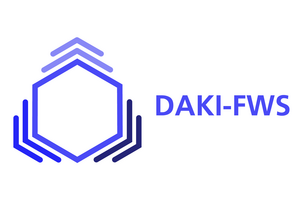December 14, 2021

The joint project DAKI-FWS (Data and AI-supported early warning system for stabilizing the German economy) intends to use AI technologies to link and evaluate data from different data sources. Based on this data, researchers will develop an early warning system that can be used in future crisis situations such as pandemics or hazardous climate extreme events to better describe their development and course and so protect and support lives and jobs, land and infrastructures. In addition, the system will improve the assessment of the impact of crises on economic aspects. The German Federal Ministry for Economic Affairs and Energy (BMWi) is funding DAKI-FWS as part of the "AI Innovation Competition” with approximately 12 million euros. The Fraunhofer Heinrich Hertz Institute (HHI) and its "Artificial Intelligence" department are acting as consortium leaders in the project. DAKI-FWS launched at the beginning of December 2021 and is scheduled to run for three years.
For an accurate assessment of the course of the Corona pandemic, experts are currently using reporting data to determine reproduction values and incidence figures as well as to provide estimates of the further course of the pandemic. Early warning systems, such as those currently used by the Robert Koch Institute (RKI), are based exclusively on reporting data from health authorities, using conventional statistical methods to detect outbreaks. However, the recent economic consequences of the Corona pandemic have demonstrated the need to improve this early detection method.
In the DAKI-FWS project, researchers are developing new intelligent detection methods by combining crisis-specific data with socially relevant data (e.g. mobile phone data, traffic data, weather and climate data). In this way, they aim to create an AI-based early warning system to detect pandemic outbreaks and climate extremes such as floods, storms, heat waves and droughts at an early stage, as well as to predict their course more accurately. Due to the more comprehensive database, experts will be in a better position to make appropriate economic decisions. This means, for example, that value chains may be maintained for longer. Such an early warning system can be applied in almost all sectors (logistics, food supply, sales, services, agriculture, groundwater and drinking water management etc.) and thus strengthen the resilience of the entire German economy.
This type of modular early warning system offers great potential. At the same time, however, it is highly complex and requires the collaboration of many different experts in the consortium to develop powerful data solutions and AI procedures that are acceptable, secure and conclusive. Therefore, the partners involved have the highest quality standards for compliance with the General Data Protection Regulation.
With its "Artificial Intelligence" department, Fraunhofer HHI is assuming overall project management for DAKI-FWS and is furthermore responsible for the development of AI with traffic and weather data. In doing so, the team can build on findings from other research projects: The SAUBER project deals with the development of a satellite-based system for displaying, forecasting and simulating air pollutants for sustainable urban and regional development. In the KLIPS project, researchers are working on an AI-based information platform for the localization and simulation of heat islands for improved urban planning. In addition, as of this year Fraunhofer HHI can draw on the expertise of the new focus group “AI for Natural Disaster Management “ (FG-AI4NDM ) of the International Telecommunications Union (ITU), the World Meteorological Organization (WMO) and the United Nations Environment Programme (UNEP).
Alongside Fraunhofer HHI, Budelmann Elektronik GmbH, Charité - Universitätsmedizin Berlin, Data4Life, the Hasso Plattner Institute for Digital Engineering, Justus Liebig University Giessen, Logiball GmbH, NET CHECK GmbH, the Robert Koch Institute, the Zuse Institute Berlin and, as subcontractors, the German Climate Computing Center and Esri Deutschland GmbH are involved. Associated partners are also the German Chamber of Industry and Commerce, Here Technologies, Schönborner Armaturen, the Hessian Agency for Nature Conservation, Environment and Geology and the German Weather Service.